More than 325,000 Teamsters union members at United Parcel Service (UPS) voted on June 16 to strike if no agreement is reached with the company by the time the current contract ends on July 31. We've gathered articles on the news from SHRM Online and other media outlets.
Union Concerns
The union wants higher pay; the elimination of the two-tier wage system that pays new workers less than more senior ones for the same job; the removal of surveillance cameras from delivery trucks; and more full-time positions.
A UPS spokesperson said that strike votes are common in contract negotiation and was confident an agreement would be reached before July 31.
(CBS News)
Economic Considerations
UPS said that the average full-time delivery driver with four years' experience makes $42 an hour. Part-time workers who sort packages make $20 an hour on average after 30 days.
A strike could delay deliveries, resulting in suppliers struggling to quickly ship goods and possibly causing production slowdowns. UPS handles about one-quarter of parcels shipped each day in the U.S., according to the Pitney Bowes Parcel Shipping Index.
Huge Private-Sector Contract
The UPS Teamsters National Master Agreement is the largest private-sector contract in North America. UPS Teamsters are working for a new five-year agreement. The vote to strike if an agreement isn't reached "shows that hundreds of thousands of Teamsters are united and determined to get the best contract in our history at UPS," said Teamsters General President Sean O'Brien. The vote was 97 percent in favor of striking if a strong contract isn't reached.
(International Brotherhood of Teamsters)
Heat Safety Agreement
UPS and the Teamsters have reached an agreement on heat safety, including vehicle enhancements to improve airflow and temperature. The company has agreed that all newly purchased U.S. small package delivery vehicles will have air conditioning starting Jan. 1, 2024. New vehicles will be allocated to the hottest parts of the country first. UPS also agreed to have a cab fan retrofitted in package cars within 30 days of contract ratification. A second fan in vehicles without air conditioning will be installed by June 1, 2024.
(UPS)
Strikes Were Up Sharply in 2022
Strikes occurred much more frequently in the U.S. last year than in 2021, according to the Cornell University School of Industrial and Labor Relations (ILR). There were 417 strikes and seven lockouts in 2022, up from 279 the previous year, the ILR found.
An organization run by AI is not a futuristic concept. Such technology is already a part of many workplaces and will continue to shape the labor market and HR. Here's how employers and employees can successfully manage generative AI and other AI-powered systems.




